The ECW516L is the first Wi-Fi 7 access point in the EnGenius Cloud Lite (ECW Lite) family, which is supposedly a lesser alternative to EnGenisu’s standard ECW hardware.
That, plus the model name, might suggest that this new AP is inferior hardware to the ECW526 that came out in mind-2024. However, that’s only true in terms of the feature set. Hadrware-wise, for most homes and SMBs, the ECW516L can be a better access point at a lower cost.
Here’s the bottom line: If you’re looking for an affordable cloud-managed Wi-Fi 7 access point, the EnGenius ECW516L is an excellent investment for your home or a small business office. Pick one or a few, depending on your desired coverage.
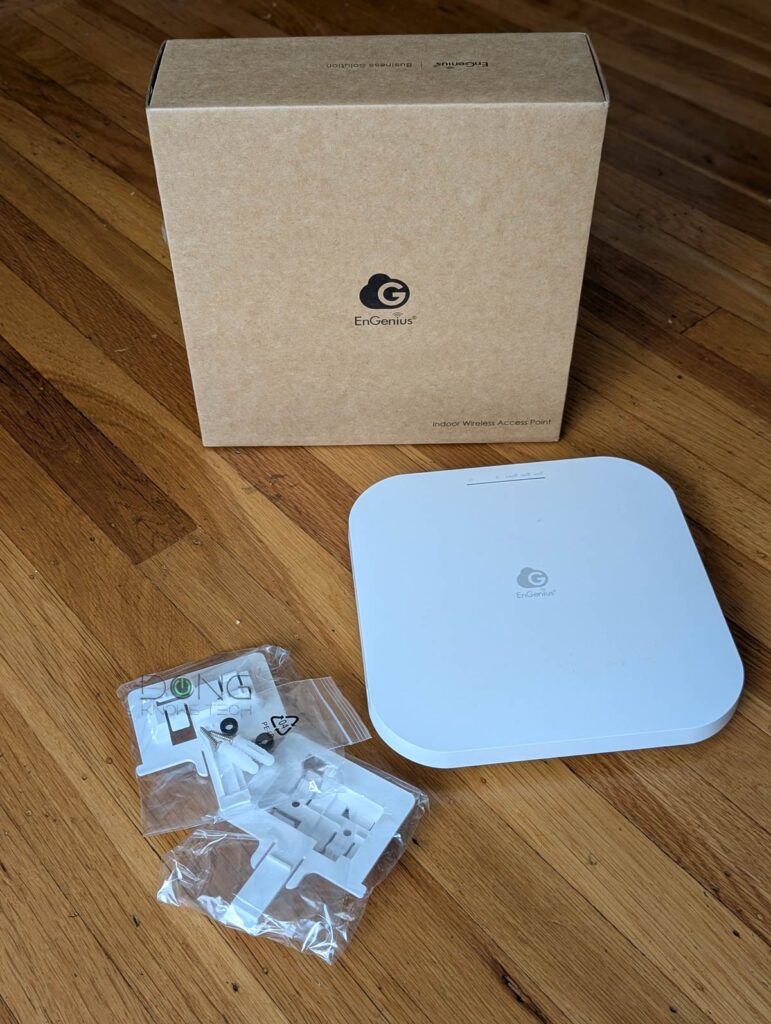
EnGenius ECW516L vs. ECW526: Trading enterprise-grade features for higher Wi-Fi 7 tier
Like most business access points, the EnGenius ECW516L comes in a package that includes minimal waste: A paper box with only the essentials, namely the AP itself and mounting accessories. There’s no power adapter or PoE injector.
To use this device, you’re assumed to already have a PoE+ switch or an injector.
Compared to the ECW526, this ECW516L is a tad larger and slimmer. It also has a PoE+ port in the middle of its south end instead of at a corner. This port, by the way, is 2.5Gbps and not 10Gbps, which is a bit of a downer.
On the inside, though, the ECW516 has better Wi-Fi specs, which makes you even a bit more disappointed that it has a 2.5Gbps uplink port. It’s a bit of an irony, considering EnGenius paired the ECW526’s low Wi-Fi specs with a 10Gbps port.
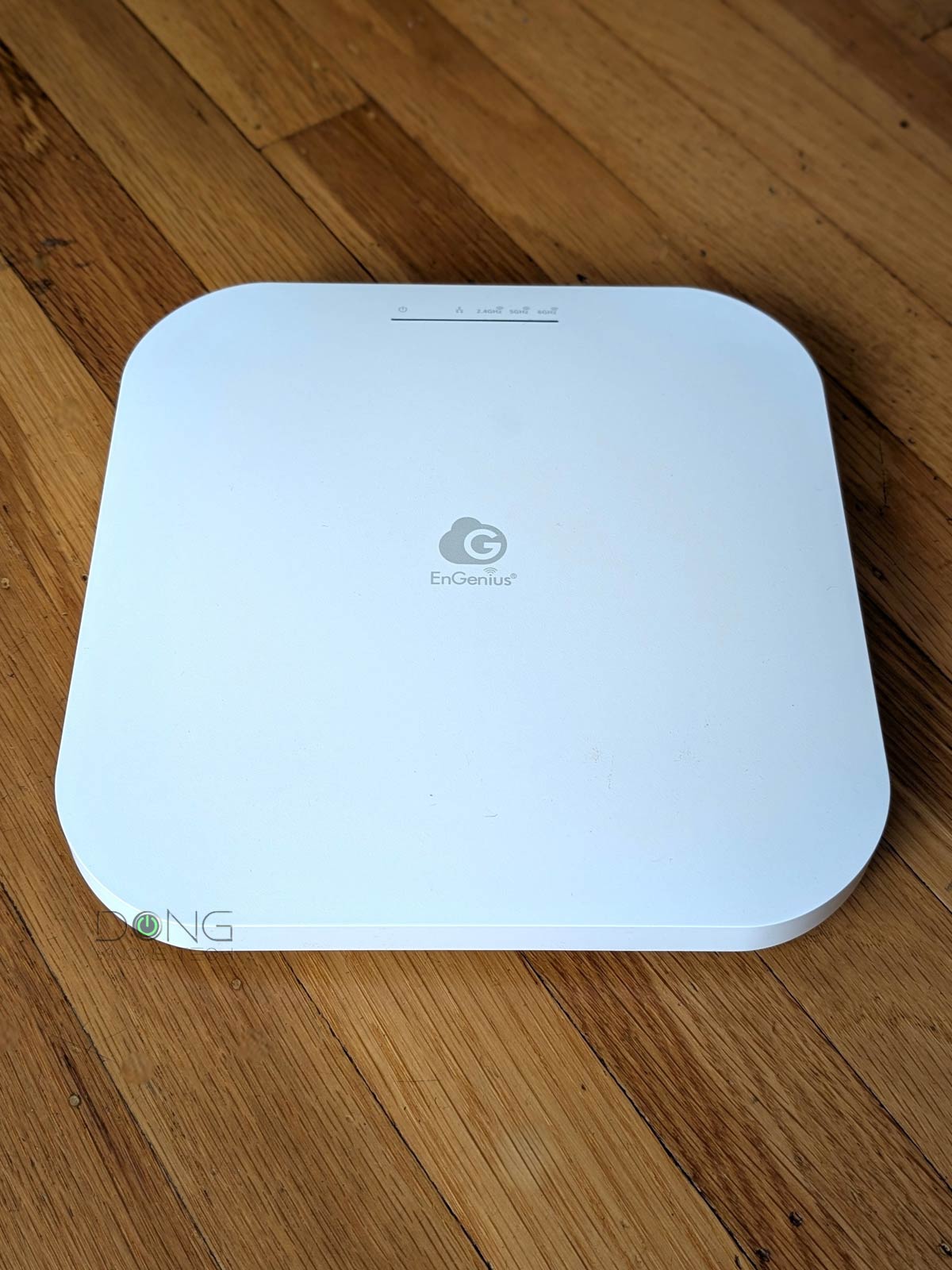
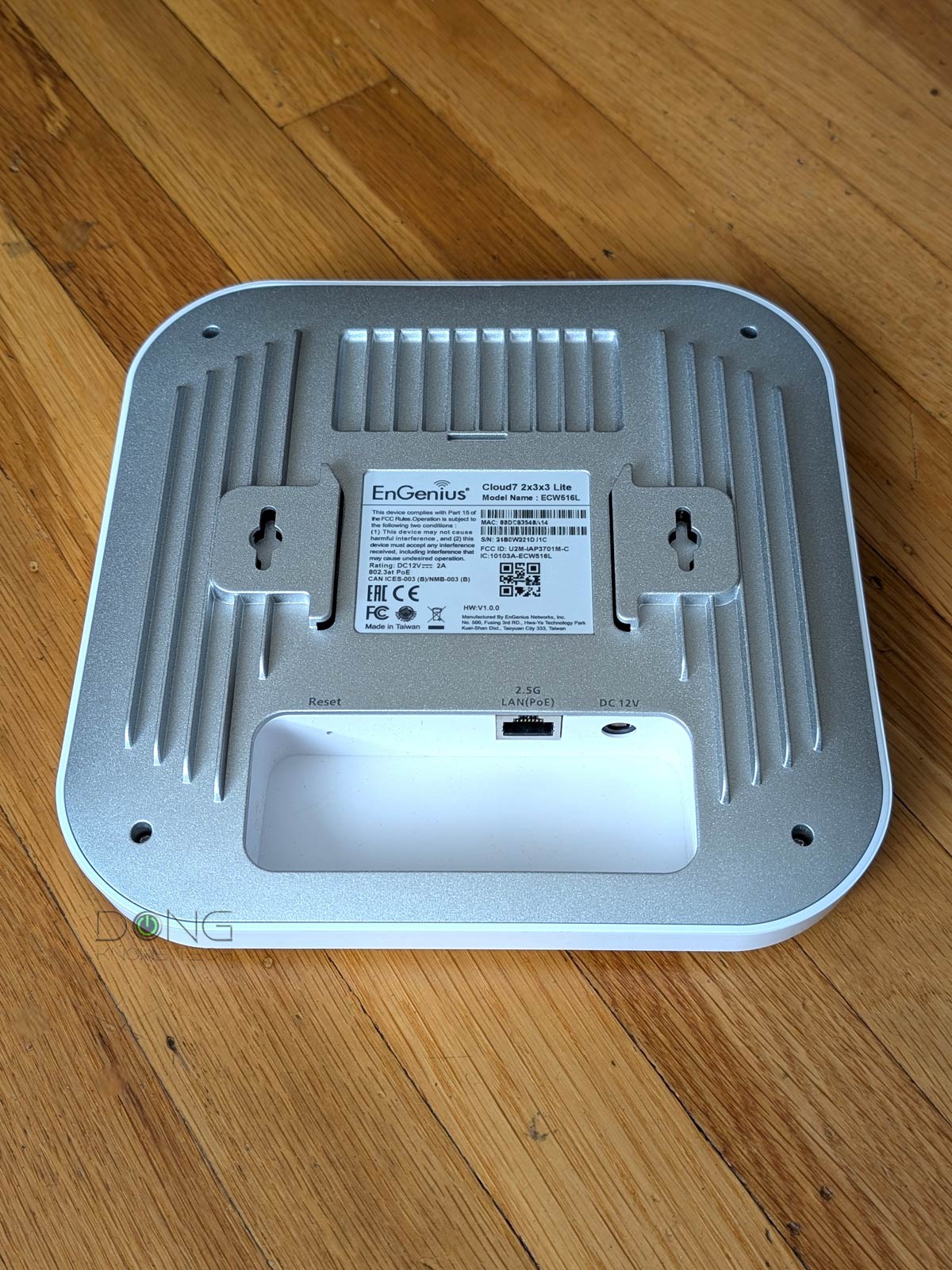
The table below shows the hardware specs of these two AP cousins.
EnGenius ECW516L vs. ECW526: Hardware specifications
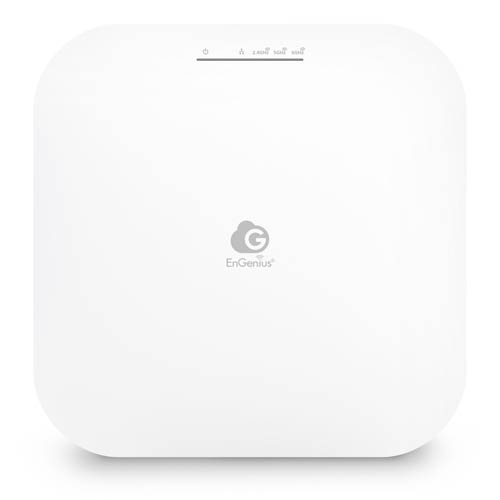 | 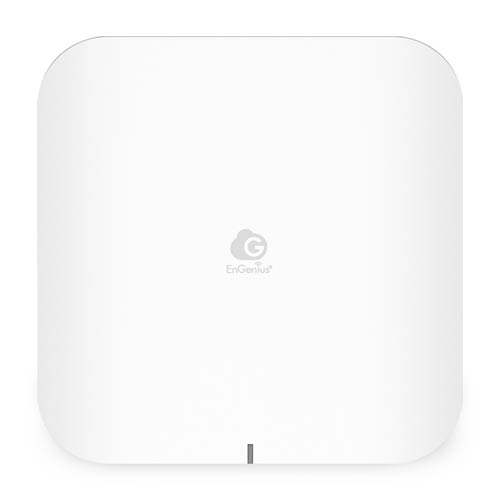 | |
|---|---|---|
| Name | EnGenius Cloud Managed Lite ECW516L Wi-Fi 7 Tri-Band Access Point | EnGenius Cloud Managed ECW526 Wi-Fi 7 Tri-Band Access Point |
| Model | ECW516L | ECW526 |
| Wi-Fi Bandwidth | Tri-band BE14000 | Tri-band BE11000 |
| Broadcasting Power (U.S.) | 22dBm per band | 2.4GHz/5GHz/6GHz: 23/22/22dBm |
| 6 GHz Specs (channel width) | 3×3 BE: Up to 8,700 Mbps (20/40/80/160/320MHz) | 2×2 BE: Up to 5800 Mbps (20/40/80/160/320MHz) |
| 5 GHz Specs (channel width) | 3×3 BE: Up to 4,300 Mbps (20/40/80/160MHz) | 2×2 BE: Up to 2200 Mbps (20/40/80/160MHz) |
| 2.4 GH Specs (channel with) | 2×2 BE: Up to 700 Mbps (20/40MHz) | |
| Number of SSIDs | 8 (single or multiple bands) | |
| Multi-Link Operation (MLO) | Yes | |
| Automated Frequency Coordination (AFC) | No (at launch) | |
| Chipset | Mediatek MT7986A Quad-core A53 2GHz | Qualcomm Networking Pro 1220 |
| Cloud-Based Platform | EnGenius Cloud Lite | EnGenius Cloud |
| Operating Mode | EnGenius Cloud (ECW account required) | |
| Mobile App | EnGenius Cloud to-Go | |
| Backward Compatibility | 802.11/axe/ax/ac/n/g/a/b | |
| Power over Ethernet (PoE) | 802.11at (PoE+) | |
| Injector Induded | No | |
| DC input | DC 12 V | |
| Adapter Included | No | |
| Multi-Gig port | 1 x 2.5GBASE-T PoE+ (uplink) | 1 x 10GBASE-T PoE+ (uplink) |
| Gigabit Port | none | |
| Wireless Security Methods | WEP/WPA/WPA2-PSK/WPA3 | |
| Authentication | IEEE 802.1X/RADIUS | |
| Dimensions (W x D x H) | 8.07 x 8.07 x 1.3 in (20.5 x 20.5 x 3.3 cm) | 7.48 x 7.48 x 1.55 in (19 x 19 x 3.95 cm) |
| Weight | 1.16 lbs (524 g) | 1.59 lbs (720 g) |
| Operating Environment | Temperature: 0°C to 40°C/32°F to 104°F Humidity: 90% or less (non-condensing) | Temperature: 0°C to 45°C/32°F to 113°F Humidity: 10% to 90% (non-condensing) |
| Internal Fan | No | |
| Release Date | February 2025 | June 2024 |
| US Launch Price (check street prices) | $199 | $300 |
As shown in the table, the ECW516L has a lot more to offer in hardware than the ECW526, which costs over 50% more. Still, essentially, the two are primarily the same in terms of real-world experience for home and SMB users.
EnGenius ECW516L: A cloud-managed (ECW) access point that doesn’t require a subscription
Like the rest of EnGenius’s ECW APs, the ECW516L can’t work as a locally-managed device. To use it, you first need to have an account with EnGenius, then log in via the engenius.ai cloud portal.
EnGenius and your privacy
Generally, using the hardware via a vendor-connected account means inherent privacy risks. Depending on the hardware, EnGenius’s login account is often an option and not required.
Here’s EnGenius’s Privacy Policy.
Online privacy and security are a matter of degree. Different companies handle their users’ data differently.
After that, it’s simple to add the AP to the online account: You can use the EnGenious Cloud to-Go mobile app to scan the QR code on the AP’s underside or manually enter its serial number in the “Inventory and License” section of the EnGenius Cloud web interface.
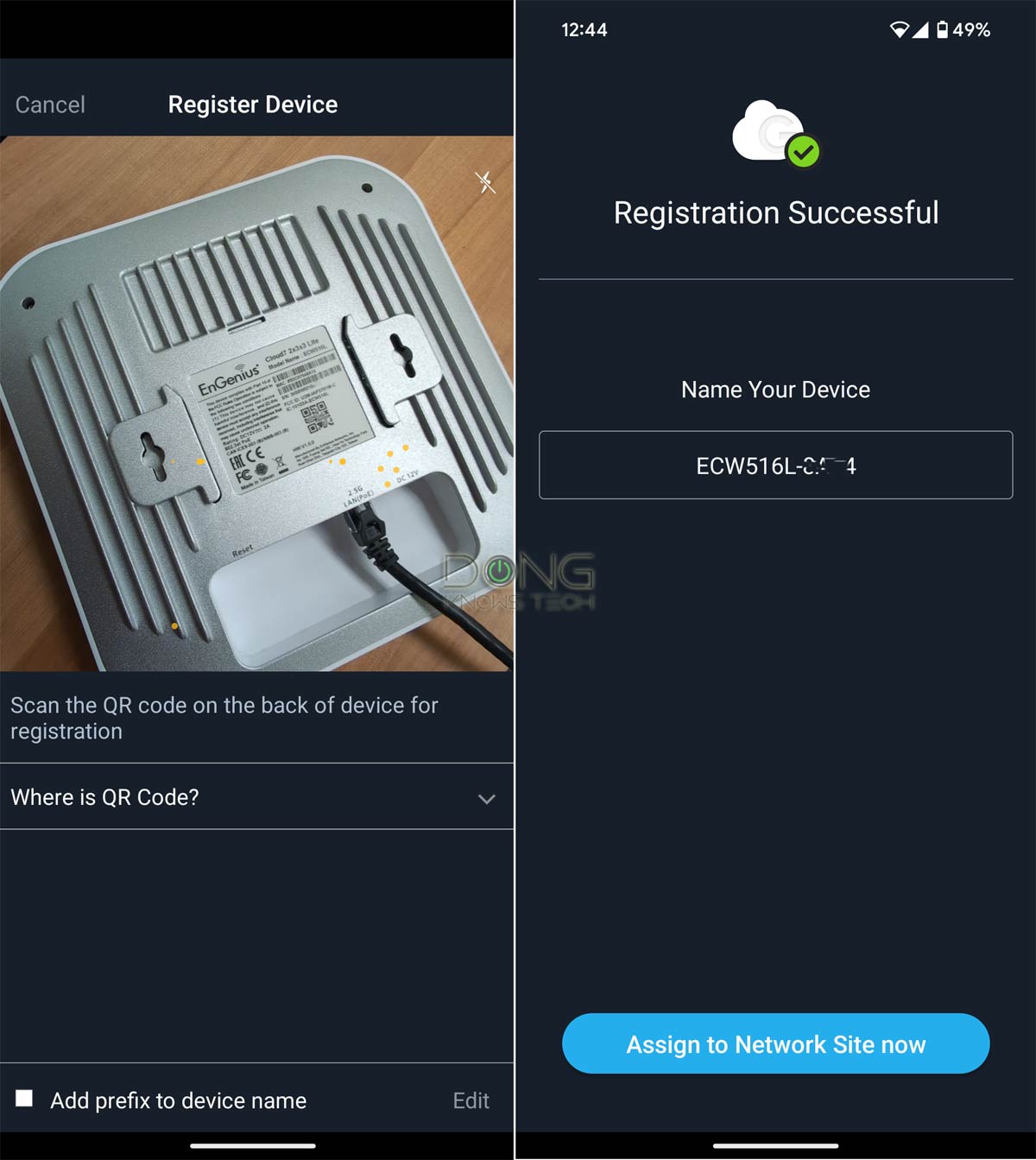
That’s it! The AP will automatically pick up the account’s Wi-Fi settings. Generally, that is how all cloud-managed APs work.
A better deal for home and SMB users with simple needs
EnGenious’s cloud management has a free Basic Plan that’s the same for both ECW Lite and ECW APs. This plan is generally enough for most homes and small offices. As an ECW Lite device, the ECW516L has its own Lite Pro plan with more features and longer data retention. Additionally, ECW Lite hardware doesn’t have a few advanced features available in the ECW Pro plan.
Tip
You can add an ECW Lite access point to an existing network with ECW APs. However, in this case, it’s best to delete and re-create the existing SSIDs to remove any potential settings that are not compatible with the new hardware.
That said, for those needing only the Basic plan, the ECW516L is a much better deal than the ECW526 since you won’t need to pay for features you’d never end up using.
Even with the Basic (free) cloud plan, the EnGenius ECW516L has lots of options. It can support up to 8 main SSIDs; each can host one, two, or all three bands. Additionally, multiple units can work together to provide a robust mesh system.
Additionally, there’s a captive portal for each SSID and QoS, as well as VLAN options.
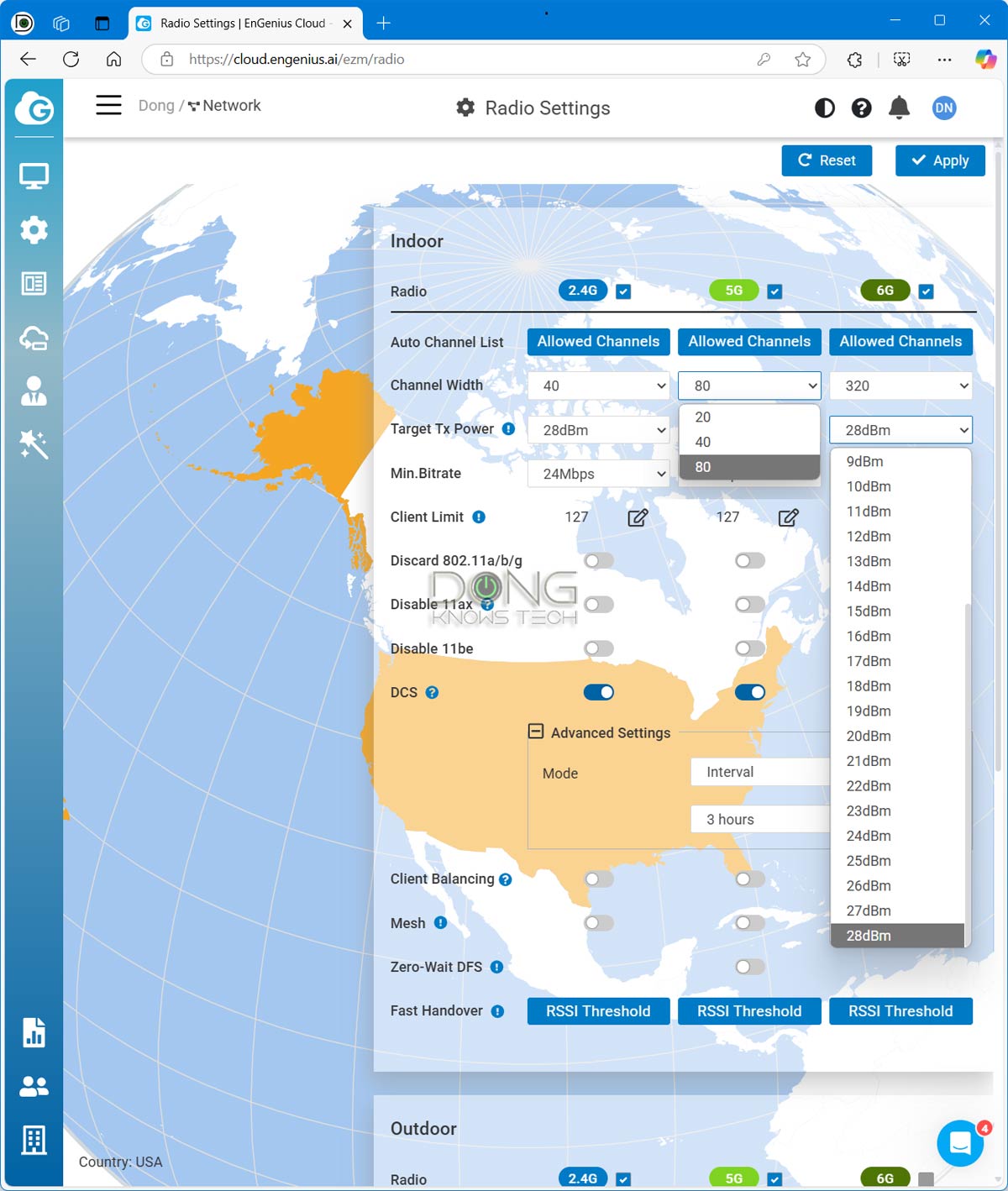
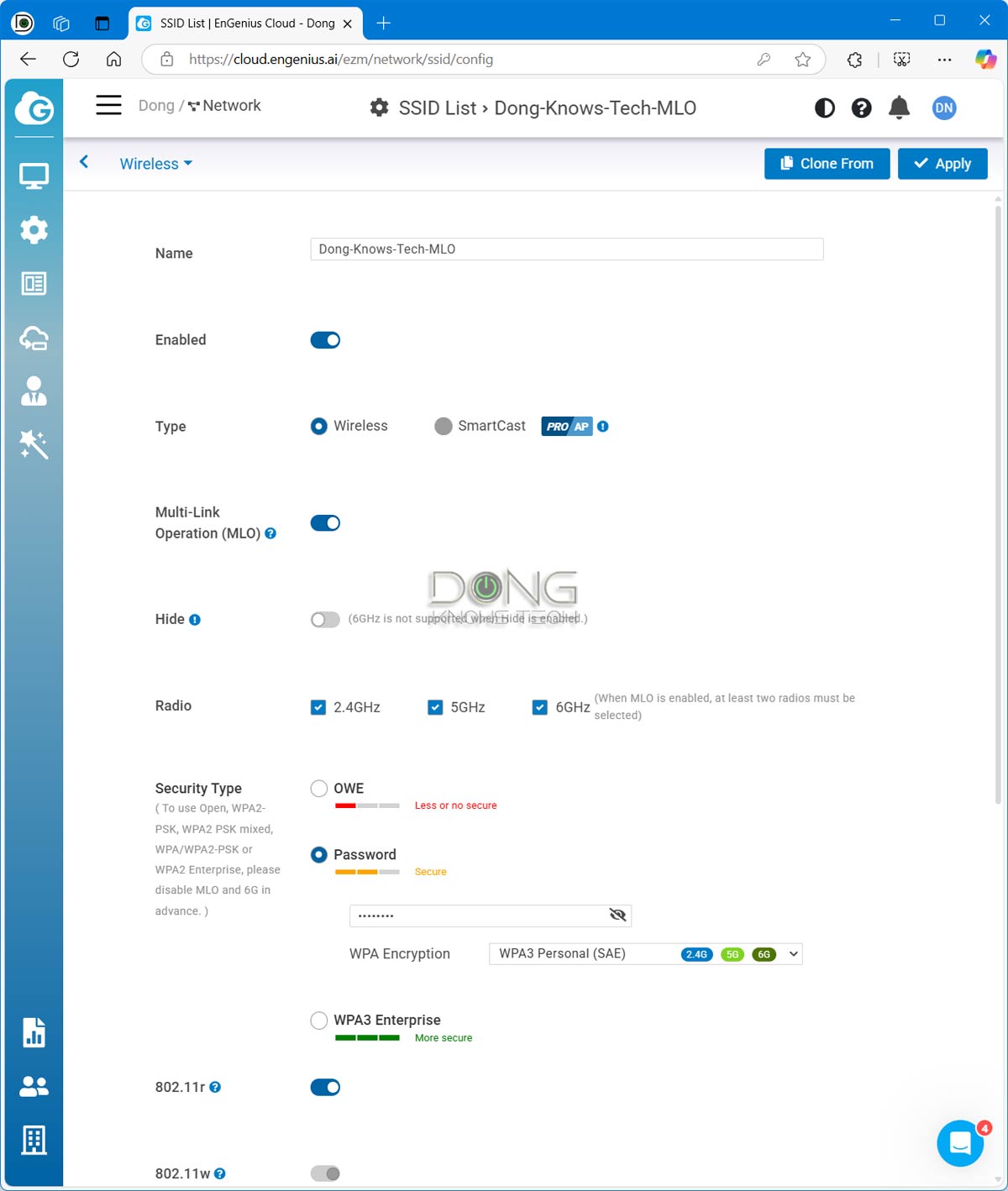
EnGenius ECW516L: Modest Wi-Fi performance
I tested the EnGenius ECW516L for almost a week and was happy with it, but that was mostly because I didn’t have high expectations. Considering the specs, the AP is not intended to wow anyone.
However, compared to the ECW526, it was better in most throughput tests, which is impressive considering its modest 2.5Gbps uplink port. Overall, you can expect up to low Gig+ of real-world speed from it at close distances and sub-Gigabit farther out.
Tip
Gig+, or Gig Plus, denotes a speed grade that is faster than 1Gbps but slower than 2Gbps. So, it’s 1.5Gbps, give or take a couple hundred megabits per second, and it’s not speedy enough to qualify as Multi-Gig Ethernet or multi-Gigabit. Intel coined the term to describe its Wi-Fi 6E client chips, the AX210 and AX211, in terms of their real-world speeds.
Gig+ primarily applies to the sustained speeds of Wi-Fi 6 or Wi-Fi 7, via a 2×2 at 160MHz connection, or broadband internet speeds.
The access point passed my 3-day stress test with no disconnection. In terms of range, which is always hard to put in numbers, the ECW516L was also modest, similar to that of the ECW526. Specifically, you can expect it to cover some 1600 ft² (150m²) of residential setting when placed at the center.
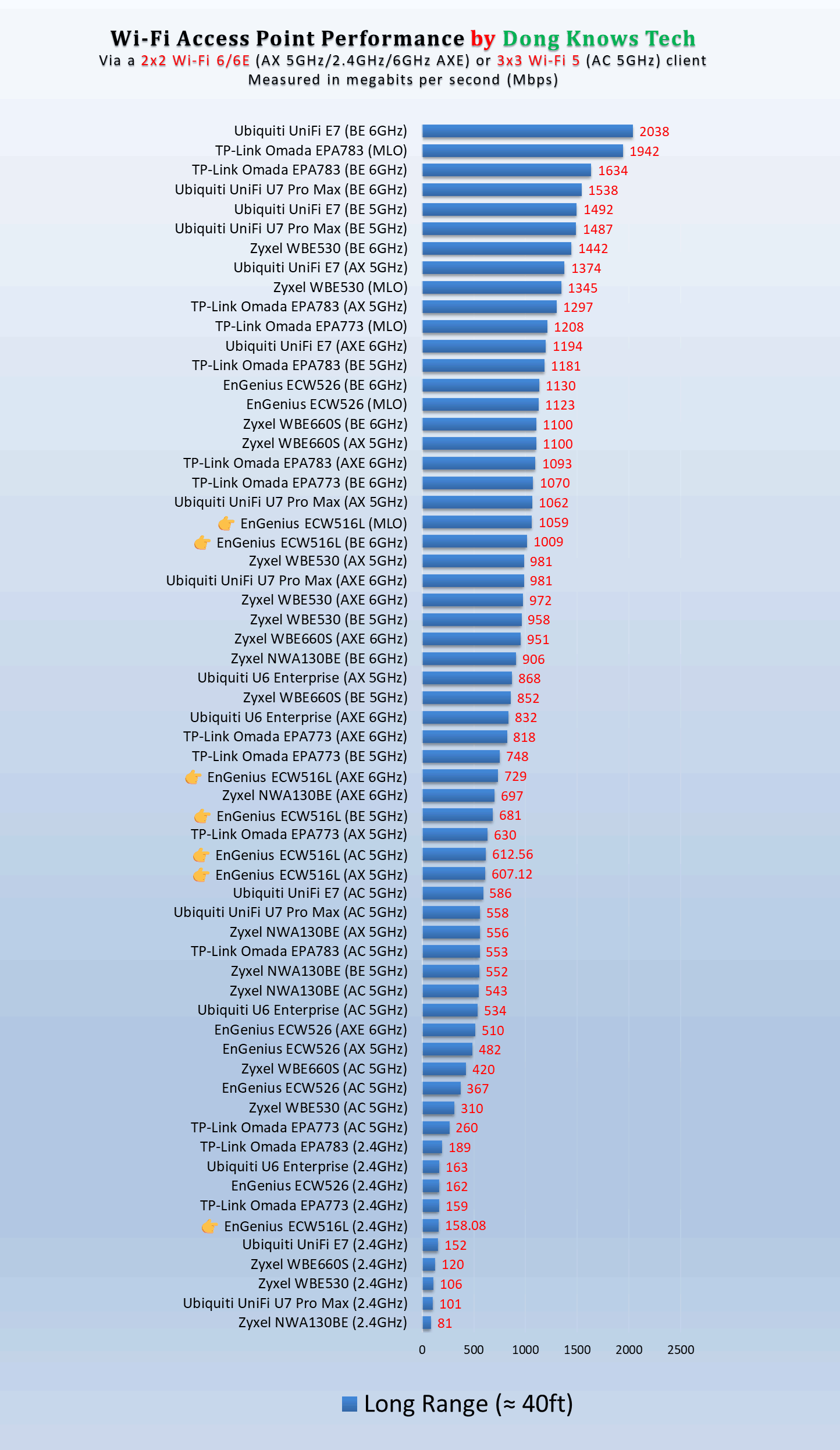
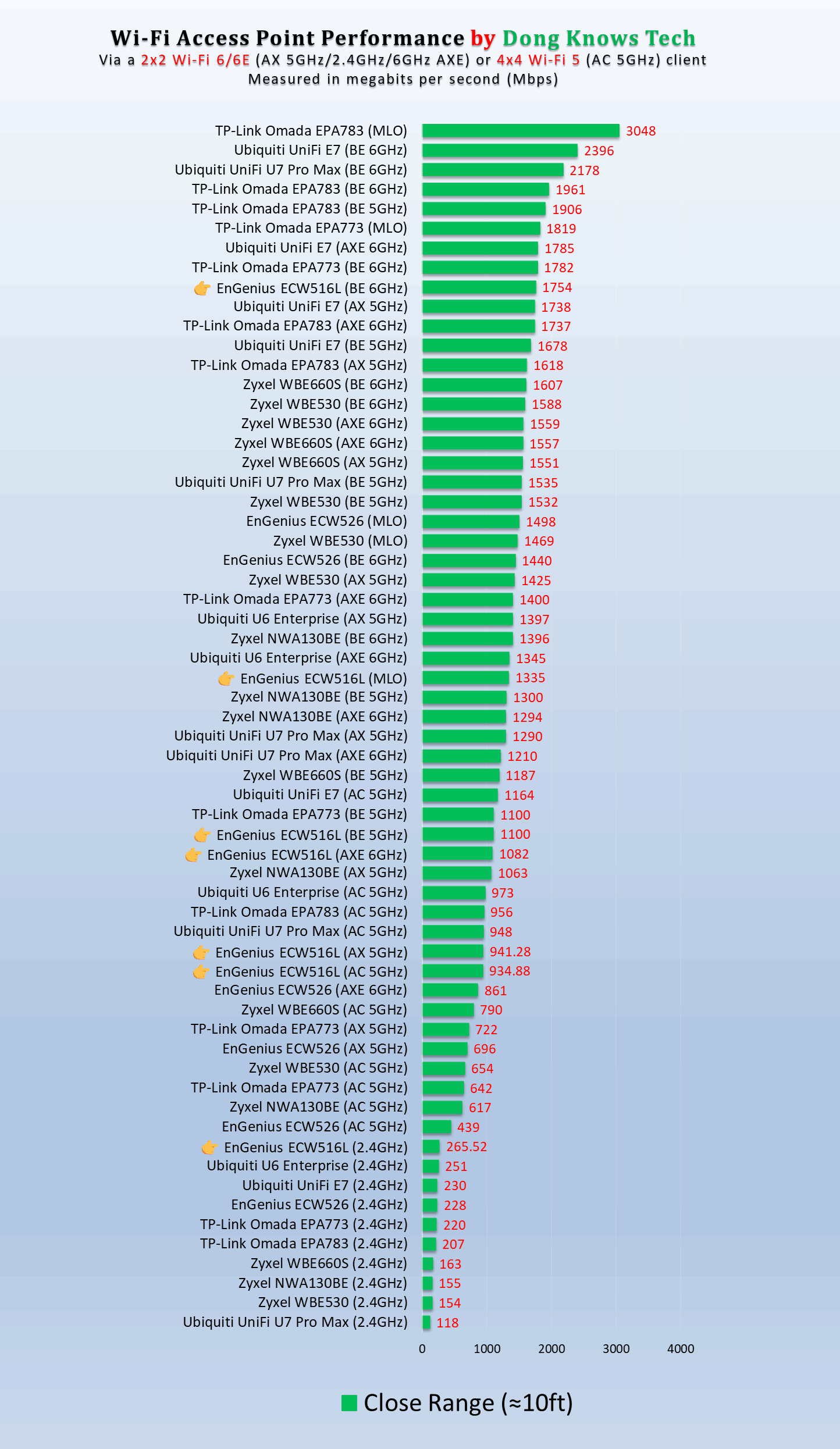
Like most Wi-Fi 7 access points, the ECW516L didn’t AFC during my testing—it’s unclear if this feature will be added in the future via a firmware update. As a result, its 6GHz band’s range was shorter than that of 5GHz.
The MLO feature, on the other hand, was there. And, like most cases, it didn’t show much improvement in terms of speed. For clients, this feature is primarily for reliability by ensuring supported clients connect to the best possible band at any given time.
Other than that, EnGenius ECW516L was completely silent and remained cool in my trial. The hardware became only slightly warm to the touch, even during heavy operations.
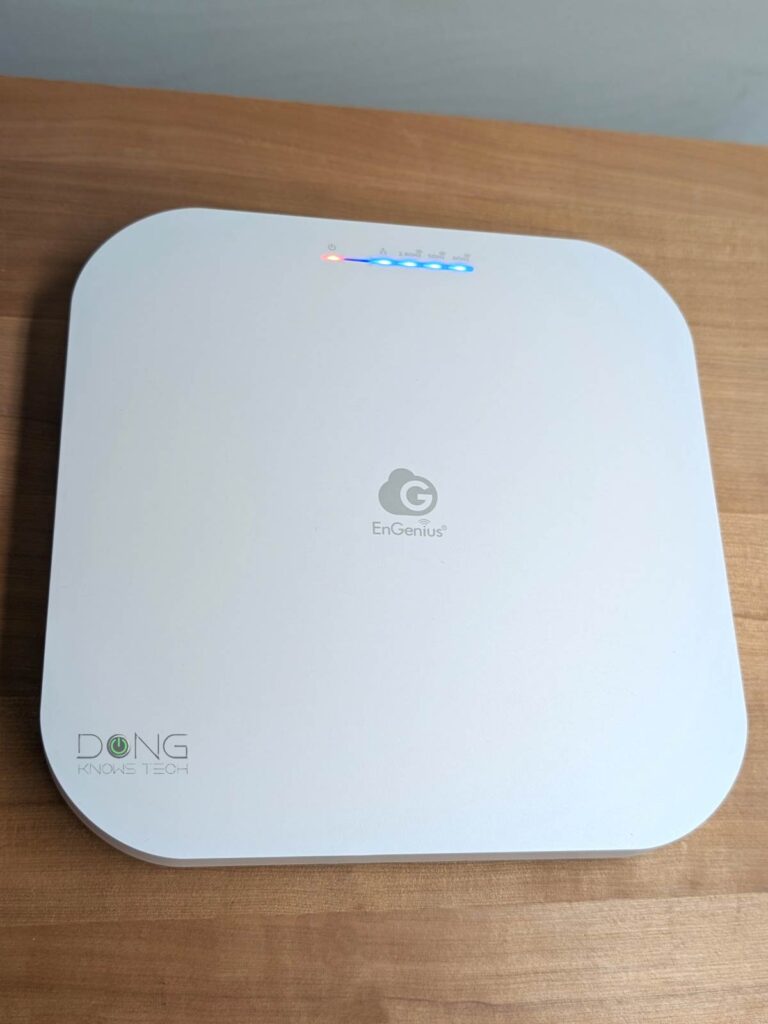
EnGenius ECW516L Wi-Fi 7 AP's Rating
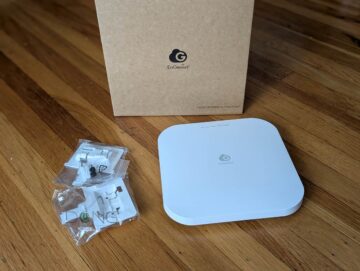
Pros
Wi-Fi 7 with reliable performance via free cloud-based management
Easy-to-use, practical design, wall-mount-ready
Comparatively affordable
Cons
Modest real-world performance and coverage
No local management, no power adapter or PoE injector included
Conclusion
The EnGenius ECW516L Cloud Managed Access Point is an affordable way to upgrade your network to Wi-Fi 7, considering its sub-$200 price tag. But it’s far from the perfect solution. The main caveats are that you must use EnGenius cloud-based management with it, and the modest Gig+ performance means those with multi-gigabit broadband might want to find something else, like one of those in the top-5 list below.
Top 5 best Wi-Fi access points
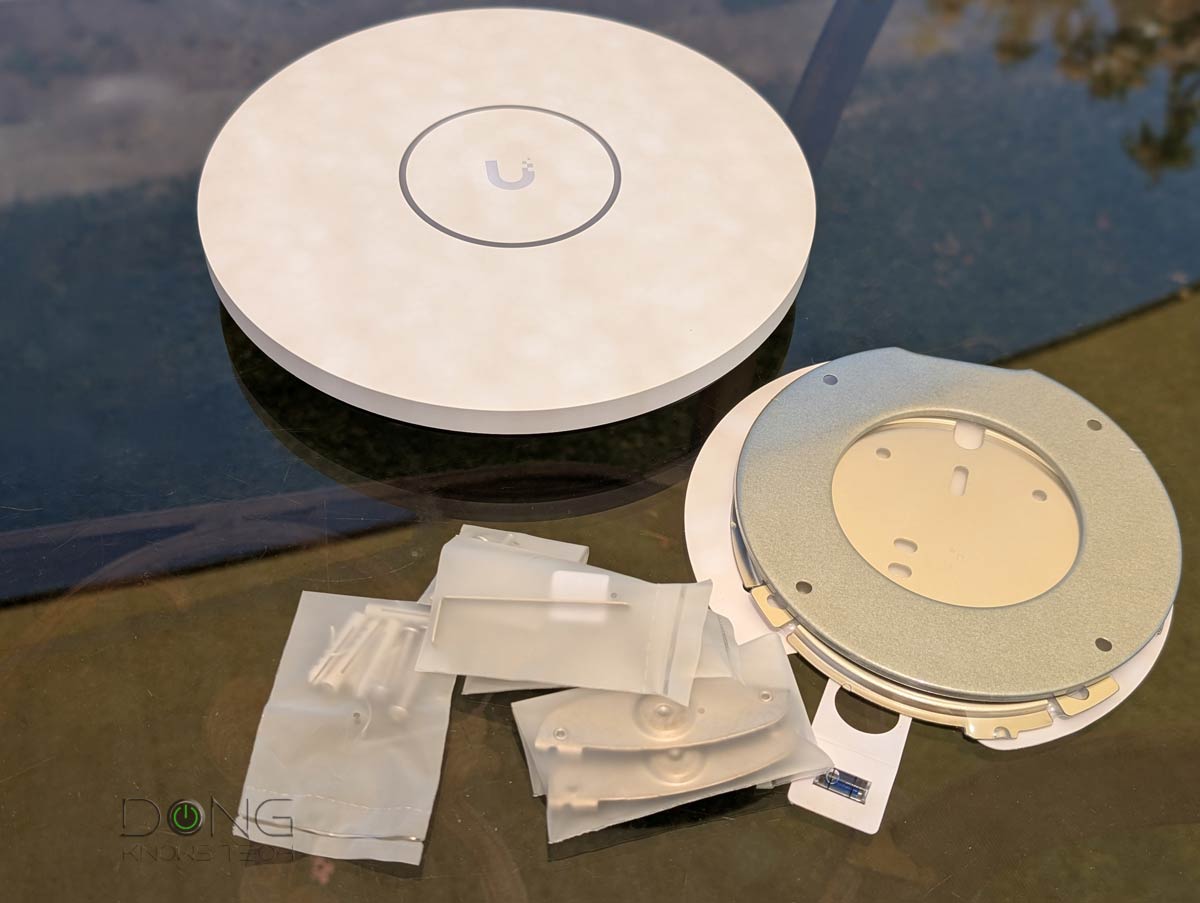 |  |  |  |  | |
| Name | Ubiquiti U7 Pro XGS’s Rating | TP-Link Omada EAP783’s Rating | Asus ExpertWiFi EBA63’s Rating | EnGenius EWS850-FIT (formerly EWS850AP) Access Point’s Rating | Zyxel WBE660S Wi-Fi 7 Access Point’s Rating |
| Price | – | – | – | – | – |
| Rating | |||||
| Description | |||||
| Statistics | |||||
| Buy this product |



Comments are subject to approval, redaction, or removal. You're in the no-nonsense zone and that applies BOTH ways.
It's generally faster to get answers via site/page search. Your question/comment is one of many Dong Knows Tech receives daily.
Thank you!
(•) If you have subscription-related issues or represent a company/product mentioned here, please use the contact page or a PR channel.